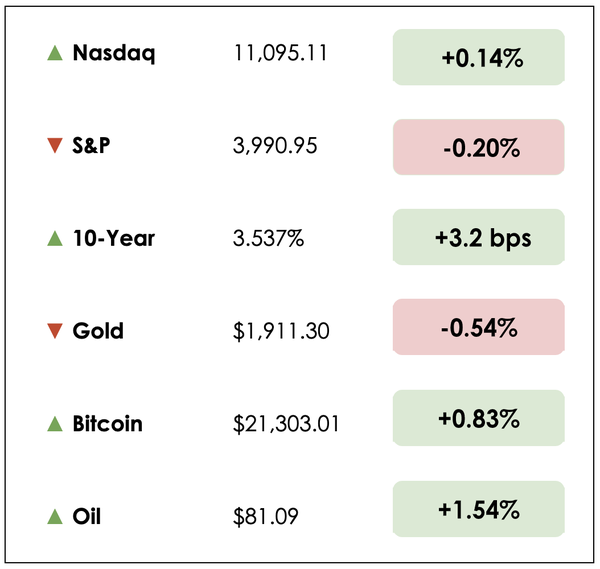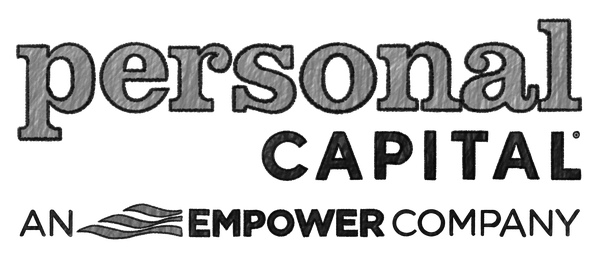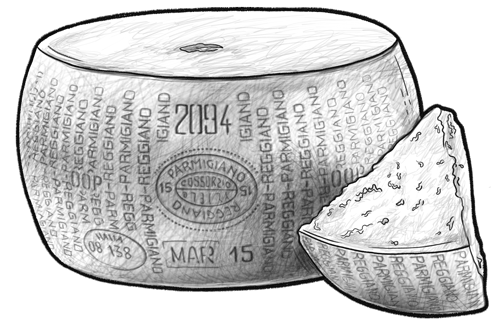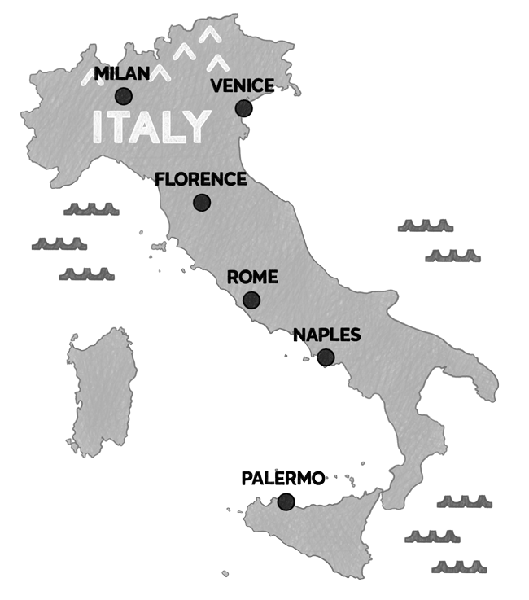King Cheese
17 January 2023

Hi, The Investor’s Podcast Network Community!
🇨🇭 Unless you live there or are a prominent business leader, you’re probably not in Davos, Switzerland, right now. Billionaires, CEOs, and economists have flocked there this week for the World Economic Forum’s annual summit.
The mood is apparently “somber” as attendees contemplate the many crises hitting the world right now, from the war in Ukraine to energy shortages, ongoing struggles with Covid-19, and the prospect of a worldwide recession.
It was day two of bank earnings, which kick off a broader corporate earnings season — Goldman Sachs (GS) and Morgan Stanley (MS) both reported sharp declines in profits.
And after the worst year on record for many debt funds, big and small investors alike are doubling down on bonds this year 🤨
Here’s the market rundown:
MARKETS
*All prices as of market close at 4pm EST
Today, we’ll discuss two items in the news: Ryan Cohen makes a big bet on Alibaba, and the NCAA’s college football feud, plus our main story on one bank that has pioneered lending markets with Parmesan cheese as collateral.
All this, and more, in just 5 minutes to read.
Get smarter about valuing businesses in just a few minutes each week.
Get the weekly email that makes understanding intrinsic value
easy and enjoyable, for free.
IN THE NEWS
👀 Ryan Cohen Launches Activist Campaign at Alibaba (FT)
- Famous as a co-founder of Chewy (CHWY) and even more so for his popularity among meme stock traders after joining GameStop’s (GME) board in January 2021, when Ryan Cohen makes moves in markets, hundreds of thousands, if not millions of traders across Reddit and other internet forums, watch closely.
- Now, he’s seemingly turning his attention to the Chinese tech giant and popular pick among value investors, Alibaba (BABA), as an activist arguing for more share buybacks.
- His push for more buybacks comes a few months after the company announced it would add another $15 billion to its buyback program running through 2025, though.
- Cohen can dramatically affect stock prices simply from his involvement or investment in a company, but his lobbying campaign will be of particular interest given the general lack of shareholder activism at Chinese firms. This is because companies in China fall under close oversight from the Chinese government, which prefers to have the final say on important matters over private investors.
- His efforts are complicated as a foreigner since many Chinese stocks, including Alibaba, use so-called “variable interest entity structures,” where foreign investors only own shares in shell companies tied to the business operating in China. Foreign shareholders are theoretically entitled to a share of profits but technically have no ownership in the underlying business.
- Additionally, the Chinese government has increasingly relied on “golden shares” in powerful tech companies like Alibaba and Tencent to push regulatory aims. In other words, the Communist Party has been snapping up stakes in companies with special voting rights, limiting other shareholders’ influence.
🏈 The NCAA’s College Football Feud (WSJ)
- College football is one of broadcasting’s hottest properties. The Big Ten Conference recently announced a deal with several networks worth over $1 billion per year, primarily to air football games.
- However, when the National Collegiate Athletic Association (NCAA) said last week that increasing revenue is its top goal, the challenges they face may be surprising because leading football conferences aren’t legally required to share any of their booming riches with the NCAA.
- Influential voices in college sports are now calling for profits to be used towards covering the growing costs of running the NCAA.
- The NCAA earns most of its revenue from the sale of broadcasting rights for its men’s basketball tournament (aka March Madness), while much of those earnings go towards legal costs, enforcement services, and health and safety research associated with football.
- With the College Football Playoff expanding to 12 teams after the 2024 season, making its rights even more valuable, directors of the playoff emphasized that all revenue generated from the games would go toward participating conferences and independent schools. But others argue that “there’s a misalignment…The NCAA is putting up a lot of resources…yet they’re not getting compensated for (it).”
- Since 1984, the Supreme Court has wrenched ownership of football broadcast rights from the NCAA in an antitrust ruling. Yet, the tension between the NCAA and conferences over lucrative football broadcasting rights will likely only increase in coming years.
Personal Capital helps users take control of their finances by blending world-class technology with human advice.
Pair industry-leading financial tools with licensed advisors and full-service planning experts across all 50 states.
WHAT ELSE WE’RE INTO
📺 WATCH: The truth behind stock buybacks
👂 LISTEN: A stock valuation masterclass with Aswath Damodaran, on Millennial Investing
📖 READ: Move over Ben Franklin — scientists use laser to redirect lightning
“In my research, I look at how operations affect financing and vice versa, and this was a prime example of how to tailor a financing infrastructure to the operating characteristics of a supply chain,” said Nikolao Trichakis, an academic researcher at the Massachusetts Institute of Technology.
What “example” was he referencing here?
Overview
Believe it or not, it’s cheese. See, since 1953, the regional bank Credito Emiliano (known locally as Credem) has accepted giant wheels of Parmigiano-Reggiano cheese as collateral for small-business loans.
For dairy farmers in Northern Italy, Credem helps replace an expensive part of their operations: the bank stores and ages their cheese wheels in climate-controlled vaults for the duration of its maturation process.
Farmers can outsource part of their operations and receive necessary financing, while the bank has pioneered a new lending market and holds the valuable cheese as insurance against loan defaults.
The King Cheese
In dairy circles, Parmigiano-Reggiano is known as the “King of Cheeses.” Supply chains for the king cheese include around 3,500 family-owned farms that largely operate as limited liability cooperatives.
The maturation process can range from 18 to 36 months. Like any great investment, the more it ages, the more valuable (and delicious) it becomes.
Because of these long lead times, though, producers must tie up working capital for years at a time.
This cash flow mismatch is exactly why farmers must access loans, which is also why Credem’s lending practices aren’t just innovative but systemically important to the output of properly aged tasty cheese.
Crucial financing
To keep the lights on, cows milked, and workers paid while they would otherwise be waiting for their cheese to mature, farmers can use these loans to pay the bills.
Whereas major corporations may be able to borrow via so-called unsecured loans, meaning with no collateral other than the business’s underlying profitability, any given dairy farmer is a comparatively small enterprise which introduces substantial credit risk.
In fact, dairy market fragmentation is something many of these farmers are proud of, seeing it as an “Italian tradition,” according to Trichakis. Consolidating into corporations would stand in the face of the centuries’ worth of cheese production these families have independently facilitated.
On top of this, prices are rather volatile for the king cheese.
Just a one-percent change in demand can result in 10% price swings, and during downturns, the luxury cheese is hit particularly hard.
How it works
Credem accepts young cheese as collateral and values it at the current market price for mature cheese. The bank aims for a loan-to-value ratio of 70-80%, cushioning them from price swings that could reduce the cheese’s collateral value and any product degradation while in storage.
Two bank-owned warehouses offer storage capacity for 440,000 80-pound cheese wheels, with an inventory value in the hundreds of millions of dollars.
Should producers default on their loans, the bank simply sells the cheese when it’s ready at market value, shoring up its balance sheet.
Trichakis goes so far as to say it’s almost “risk-free.”
Of course, there are plenty of risks still, including downturns in cheese demand or warehouse accidents that destroy cheese collateral. Still, incredibly, the loans are financially sound despite their unorthodox nature.
Custody pays
Because the bank has direct custody of the cheese, should any issues arise during the maturation process, they can simply call up producers and inform them that their collateral has declined in value so they can deposit more.
While the cheese-lending practice has brought Credem goodwill locally and notoriety, it remains only approximately 1% of its overall business.
Trichakis argues that “It allows Credem to be perceived as a bank that cares about the community” because “lending is something that people don’t really like in Italy. They think of usury, going back to Shylock in The Merchant of Venice…so for a bank to be able to set up this infrastructure and to showcase their value to the community, it’s significant.”
Dive deeper
Our writing today is derived from a Harvard Business School case study. If you care to read the whole thing, you can purchase it here.
Or just check out this article from Forbes on the topic.
That’s it for today on We Study Markets!
See you later!
If you enjoyed the newsletter, keep an eye on your inbox for them on weekdays around 6pm EST, and if you have any feedback or topics you’d like us to discuss, simply respond to this email.












